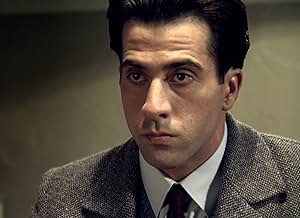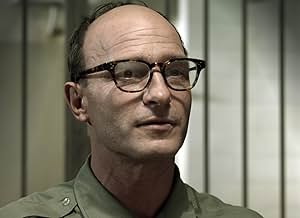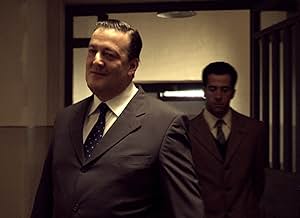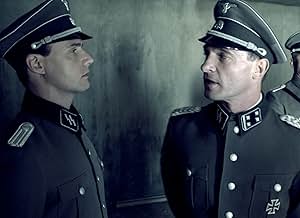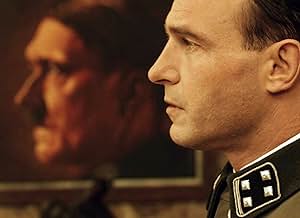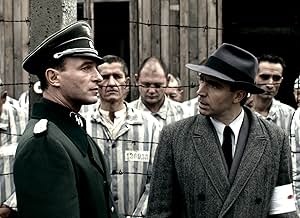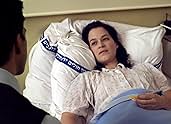Añade un argumento en tu idiomaBased upon the final confession of Adolf Eichmann, made before his execution in Israel as he accounts to Captain Avner Less, a young Israeli police officer, of his past as the architect of H... Leer todoBased upon the final confession of Adolf Eichmann, made before his execution in Israel as he accounts to Captain Avner Less, a young Israeli police officer, of his past as the architect of Hitler's plan for the Final Solution. Captured by intelligence operatives in Argentina, 15 ... Leer todoBased upon the final confession of Adolf Eichmann, made before his execution in Israel as he accounts to Captain Avner Less, a young Israeli police officer, of his past as the architect of Hitler's plan for the Final Solution. Captured by intelligence operatives in Argentina, 15 years after World War II, Eichmann (Kretschmann), the world's most wanted man, must be bro... Leer todo
- Self
- (metraje de archivo)
- (voz)
- Baroness Ingrid von Ihama
- (as Tereza Srbová)
- Hannah
- (as Tilly Golding)
Reseñas destacadas
All of that is leading up to my strong suggestion that you skip the film and read Hannah Arendt's amazing book about the actual Eichmann trial in Jerusalem, Eichmann: A Report on the Banality of Evil. Here you will find a non-dramatic, non-titillating version of the story that neither exaggerates nor diminishes Eichmann's evil, but rather reveals him in a matter-of-fact way as an opportunist, a careerist who merely wanted to advance, climb the ladder, attain the next "title," etc. He apparently did not have any particular hatred toward Jews. None of this in my estimation makes him less evil; the book actually reveals the "banality" of his evil by taking away the specter of a crazed monster. His evil lies in its being sane and in a sense "ordinary." Therefore, given its serious subject matter, I feel the film only partially reflects the facts Arendt reveals so clearly, obscuring them with with sex and useless side stories. The performances are good, the film is well made, etc. That's not my point. If you want to make a formulaic film, a horror film, a sexy film, or any other kind of film, have at it. But don't use Eichmann as your subject matter. The subject matter is too serious to be misused in any way. Read the book, please.
When I bought this title I was expecting a detailed examination of "the architect of Hitler's plan"; no matter the bias. All I received in return was a turgid family drama set against a few pointless conversations between the police captain Less and Eichmann. Once sensationalised by dubious episodes in the man's Nazi career all that remained were constant accusations and denials by Less and Eichmann. Admittedly this man may not have been exciting or even entertaining within the Nazi regime, but one thing he most certainly was, was life-changing.
There is an interested audience for films that seek to examine the minds of the "architects of Hitler's plan", as Oliver Hirschbiegel's "Downfall" has shown. Studying German history I was more concerned with the Socialists than the National Socialists, but the Nazi motivation and objectives are still a fascinating aspect of 20th Century History. "Eichmann" however does nothing to advance the understanding of the Nazis, nor the Eichmann that oiled the wheels of the Holocaust, and seems more like Jewish apologia for interrogating Eichmann by a man who suffered personal tragedy in the Holocaust, convicted him on mere supposition and rumour, and murdered him because of intense social and political pressure.
The film opens after the 1960 capture of Eichmann from his home in Argentina, the country where he and his wife and four sons had been in hiding since the end of WW II. Adolf Eichmann (brilliantly portrayed by Thomas Kretschmann) had been the World's Most Wanted Man and his transport to Israel was met by jeering crowds. The Israeli Minister Tormer (Stephen Fry) elects police captain Avner Less (Troy Garity) to conduct the interview in what is supposed to be a top-secret assignment. But the news escapes and Avner's wife Vera (Franka Potente), suffering from polio of the spine, and the Avner children are marked as targets by the Israeli's who do not appreciate the duty of Avner Less's obligation to interrogate and gain a complete confession from Eichmann before he can be tried. The months that the interrogations take prove that the Israeli's believed in justice: the facts must be proved completely before the prisoner is tried for atrocities.
During the interrogation months Eichmann is shown in flashbacks to have been not only following the orders of Hitler, but being committed to the purification of the 'Aryan race'. What screenwriter Snoo Wilson and director Robert Young allow is for us to see the human weakness of Eichmann as portrayed By Kretschmann: he had mistresses, including one Austrian Jewess and a Hungarian Countess who urged him to complete the Final Solution, he coldly signed extermination orders 'because he had to follow Hitler's orders', yet he also was an apparently devoted father to his own sons. Equal time is given to allow the audience to see the interaction between the conflicted parties of the interrogation: Avner was convinced he must prove beyond a shadow of a doubt that the prisoner was indeed guilty of all of the crimes fro which he was accused. The interrogations become a battle of wills between the smarmy, oily, manipulative Eichmann and the personally distraught Avner. At the close of the film the real Avner E. Less provides voice over regarding the hanging of Eichmann along with statistics of the Nazi atrocities that no matter how often they are quoted continue to astonish our ability to comprehend.
The only artistic aspect of the film that is ultimately distracting is the director's choice to have cinematographer Michael Conner use near black and white/sepia toning for the film. Certain scenes break into real color but the tone of the film footage seems dirty - and perhaps that is the reason for the choice. Richard Harvey adds the musical score, and there are some very fine cameo roles by Delaine Yates, Tereza Srbova, and Judit Viktor. But in the end it is the performance by Thomas Kretschmann that is terrifyingly real: he deserves awards for his courage to accept this role and for his unforgettable impersonation of a man so evil that under other actor's skills would be simply unbelievable. It is Kretschmann's extraordinary performance that brings home the terror of his film.
Grady Harp
Yes, the film suffers from some weird accents. Thomas Kretschmann, as Eichmann himself, speaks in a clipped German accent; Troy Garity, Franka Potente and Stephen Fry (in a bizarre but oddly convincing performance as, of all things, the Israeli Minister of Justice) all have indeterminately foreign accents, and none of it really makes sense.
Having said that, Kretschmann carries off the job he has been asked to do, and Garity is really very good as Avner Less, who was not Eichmann's prosecutor (as someone else stated) but his interrogator. Less was not a lawyer but a police officer. The subplot of his wife being chronically ill is presumably there because it was true; it would have been better if they'd left it out, because what drama there is in this film is the battle of wills between Less the dogged interrogator and Eichmann the stolidly evasive interrogatee.
I note in passing that Stephen Fry might almost be the rather more well-fed first cousin, or perhaps uncle, of Ciaran Hinds in "Munich". The accent is the same, and the tallness, slicked-down hair and intimidating bulk is very similar.
If they'd toned down the lurid stuff about Eichmann's sex life and focused on what he actually did for a living, this could have been as good as "Conspiracy". Pity.
¿Sabías que...?
- CuriosidadesAccording to a British reporter on location, fellow cast members Troy Garity and Thomas Kretschmann were so upset with script revisions of the baby-in-office scene that Kretschmann promptly threw them in the trash, explaining, 'I'll just file this here for safekeeping.' The revisions were later dropped.
- Pifias(at around 1 min) In the scene where the minister leaves the room after telling Avner that his father had been sent to Auschwitz by Eichmann, a large contemporary map of Europe is visible on the wall. The maps contains the re-unified Germany, the successor states of the Soviet Union, the broken up former Yugoslavia, and the split Czech and Slovak Republics - which is the late 1990s status and not 1960/61.
- Citas
Avner Less: [after Eichmann's interrogation and trial] We showed him more justice than he ever showed us.
- Banda sonoraAlma Partida
Words and Music by Mauricio Vanegas
West One Music Ltd
Selecciones populares
- How long is Eichmann?Con tecnología de Alexa
Detalles
- Fecha de lanzamiento
- Países de origen
- Sitio oficial
- Idiomas
- Títulos en diferentes países
- Adolf Eichmann
- Localizaciones del rodaje
- Empresas productoras
- Ver más compañías en los créditos en IMDbPro
Taquilla
- Presupuesto
- 8.000.000 US$ (estimación)
- Recaudación en Estados Unidos y Canadá
- 2706 US$
- Fin de semana de estreno en EE. UU. y Canadá
- 573 US$
- 31 oct 2010
- Recaudación en todo el mundo
- 2706 US$
- Duración
- 1h 36min(96 min)
- Color
- Mezcla de sonido
- Relación de aspecto
- 1.85 : 1


